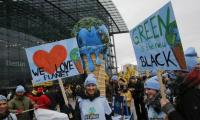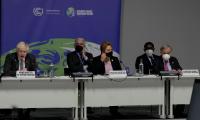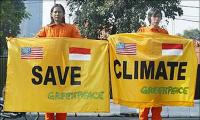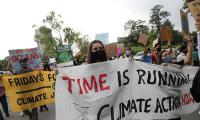UN Climate Talks Stalled on Finance: No Progress in Bonn
Climate finance negotiations at the UN climate talks in Bonn have stalled, with developed countries failing to commit to funding needed to address the climate crisis in developing nations. The lack of progress raises concerns about the success of COP29 in Baku.
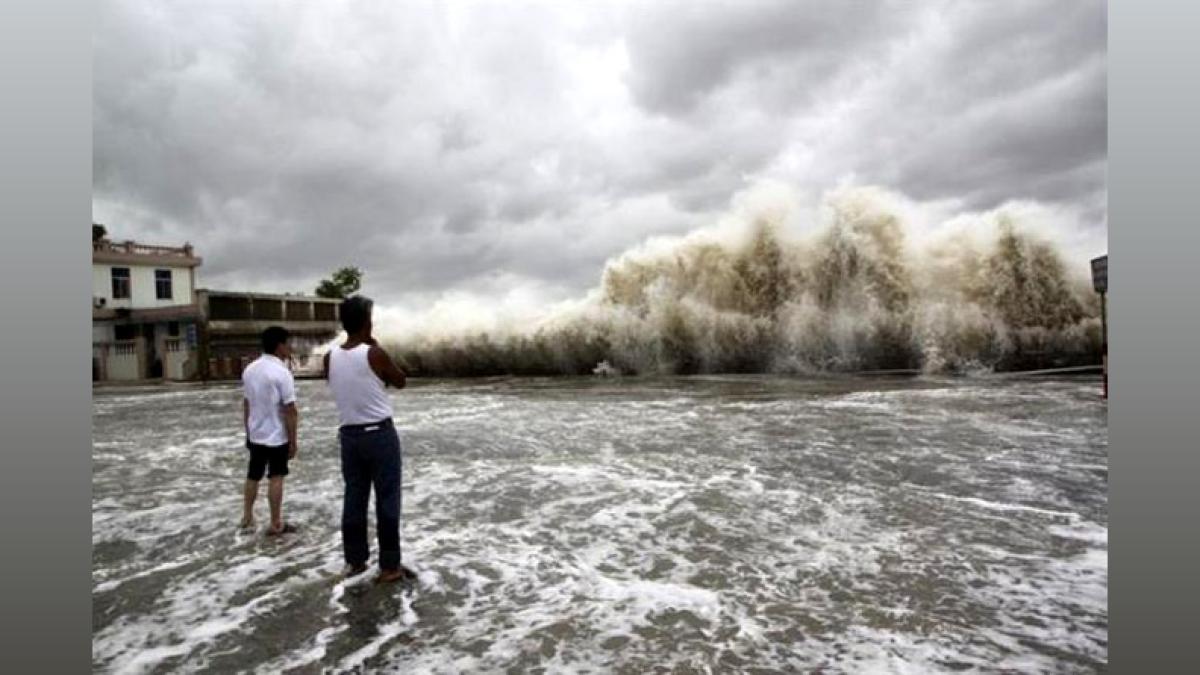
New Delhi, Jun 11 (PTI) Countries have not made any concrete progress on the issues related to the funding needed to address the climate crisis at the mid-year UN climate talks in Germany's Bonn even as floods, extreme rains, and brutal heat waves continue to ravage nations across the world.
Climate finance is at the centre of discussions in Bonn, as countries need to agree on the New Collective Quantified Goal (NCQG) -- the new amount developed nations must mobilize every year starting in 2025 to support climate action in developing countries -- at the UN climate conference (COP29) in Baku in Azerbaijan in November.
Mariana Paoli, Global Advocacy Lead at Christian Aid, said the lack of progress on the finance negotiations so far in Bonn is "very disappointing".
"It is time for rich countries to step up and deliver their financial commitments to enable climate action in developing countries. They must provide new, additional, and at-scale public finance to fulfill their obligations under the Paris Agreement. It is ridiculous that less than six months before COP29, and after two years of negotiations, developed countries have still not shown how much money they are willing to commit," she said.
In 2009 in Copenhagen, rich countries promised to provide USD 100 billion every year from 2020 to developing countries to help them mitigate and adapt to climate change.
But delays in achieving this goal eroded trust between developed and developing nations and have been a continual source of contention during annual climate negotiations.
A recent report by the Organisation for Economic Co-operation and Development (OECD) said developed countries met the long-standing USD 100-billion-a-year promise in 2022. However, 69 per cent of this was provided in the form of loans.
With the Earth's global surface temperature already 1.15 degrees Celsius above the average in 1850-1900, climate scientists say countries need to take urgent action to reduce heat-trapping greenhouse gas emissions by at least 43 percent by 2030 (compared to 2019 levels) to limit warming to 1.5 degrees Celsius.
Developing nations argue they cannot be expected to reduce CO2 emissions faster if developed countries -- historically responsible for climate change -- do not provide enhanced financial support.
Now, rich countries are expected to raise more than USD 100 billion, with developing countries demanding trillions of dollars to tackle climate change.
At Bonn, countries are still trying to determine what should be counted as climate finance, how big the overall amount should be, who will pay for it and over how many years, and who will receive the money.
Mohamed Adow, the director of the climate and energy think tank PowerShift Africa, said, "Negotiators from the global north at the Bonn climate summit risk undermining the key outcomes from COP28 last year. Developed countries are backtracking on their commitments made in Dubai to accelerate discussions around climate finance. Rich countries have always dragged their feet when it comes to paying their fair share to tackle the climate crisis - a crisis their emissions have caused. That approach is simply unacceptable."
"The new long-term climate finance goal is the key issue at this year's COP29 summit in Baku, Azerbaijan, and talks are going at a snail's pace in Bonn. It's vital that countries shift gears and prioritize this issue for the second week. They need to identify a possible landing ground ahead of Baku. That is the whole point of these Bonn talks, so negotiators have work to do," he said.
Points of Contention:
Some developed countries, such as Norway, say countries with high emissions and higher economic capacities, including countries like China and petrostates that define themselves as developing countries under the Paris Agreement, should be part of the contributor base.
Developing countries, on the other hand, cite Article 9 of the Paris Agreement, which states that climate finance must flow from developed countries to developing countries.
Developed countries also want the money to go to countries that are most vulnerable to climate impacts, such as the least developed countries and small island developing states. Developing countries say they all are eligible for the support.
Developing countries also argue that there should be clarity on what constitutes climate finance; for example, development finance should not be counted as climate finance. They say this money should not be given in the form of loans, as has happened in the past, should not be double-counted, and should be additional to development finance.
"Developed countries look at climate finance as another money-making opportunity. The OECD report is a preview of their approach. Sixty-nine percent of the funds they have provided are loans, and a very small part of that is concessional loans. Money is going back to rich countries, and they are earning huge profits. That's not the definition of climate finance.
"They do not want to agree on an official definition of climate finance because, for them, it is about creating new markets for their corporations. It's about continuing with the same hegemony with a financial system that has caused the climate crisis in the first place and the same colonial extractive mindset," climate activist Harjeet Singh said.
Climate finance is at the centre of discussions in Bonn, as countries need to agree on the New Collective Quantified Goal (NCQG) -- the new amount developed nations must mobilize every year starting in 2025 to support climate action in developing countries -- at the UN climate conference (COP29) in Baku in Azerbaijan in November.
Mariana Paoli, Global Advocacy Lead at Christian Aid, said the lack of progress on the finance negotiations so far in Bonn is "very disappointing".
"It is time for rich countries to step up and deliver their financial commitments to enable climate action in developing countries. They must provide new, additional, and at-scale public finance to fulfill their obligations under the Paris Agreement. It is ridiculous that less than six months before COP29, and after two years of negotiations, developed countries have still not shown how much money they are willing to commit," she said.
In 2009 in Copenhagen, rich countries promised to provide USD 100 billion every year from 2020 to developing countries to help them mitigate and adapt to climate change.
But delays in achieving this goal eroded trust between developed and developing nations and have been a continual source of contention during annual climate negotiations.
A recent report by the Organisation for Economic Co-operation and Development (OECD) said developed countries met the long-standing USD 100-billion-a-year promise in 2022. However, 69 per cent of this was provided in the form of loans.
With the Earth's global surface temperature already 1.15 degrees Celsius above the average in 1850-1900, climate scientists say countries need to take urgent action to reduce heat-trapping greenhouse gas emissions by at least 43 percent by 2030 (compared to 2019 levels) to limit warming to 1.5 degrees Celsius.
Developing nations argue they cannot be expected to reduce CO2 emissions faster if developed countries -- historically responsible for climate change -- do not provide enhanced financial support.
Now, rich countries are expected to raise more than USD 100 billion, with developing countries demanding trillions of dollars to tackle climate change.
At Bonn, countries are still trying to determine what should be counted as climate finance, how big the overall amount should be, who will pay for it and over how many years, and who will receive the money.
Mohamed Adow, the director of the climate and energy think tank PowerShift Africa, said, "Negotiators from the global north at the Bonn climate summit risk undermining the key outcomes from COP28 last year. Developed countries are backtracking on their commitments made in Dubai to accelerate discussions around climate finance. Rich countries have always dragged their feet when it comes to paying their fair share to tackle the climate crisis - a crisis their emissions have caused. That approach is simply unacceptable."
"The new long-term climate finance goal is the key issue at this year's COP29 summit in Baku, Azerbaijan, and talks are going at a snail's pace in Bonn. It's vital that countries shift gears and prioritize this issue for the second week. They need to identify a possible landing ground ahead of Baku. That is the whole point of these Bonn talks, so negotiators have work to do," he said.
Points of Contention:
Some developed countries, such as Norway, say countries with high emissions and higher economic capacities, including countries like China and petrostates that define themselves as developing countries under the Paris Agreement, should be part of the contributor base.
Developing countries, on the other hand, cite Article 9 of the Paris Agreement, which states that climate finance must flow from developed countries to developing countries.
Developed countries also want the money to go to countries that are most vulnerable to climate impacts, such as the least developed countries and small island developing states. Developing countries say they all are eligible for the support.
Developing countries also argue that there should be clarity on what constitutes climate finance; for example, development finance should not be counted as climate finance. They say this money should not be given in the form of loans, as has happened in the past, should not be double-counted, and should be additional to development finance.
"Developed countries look at climate finance as another money-making opportunity. The OECD report is a preview of their approach. Sixty-nine percent of the funds they have provided are loans, and a very small part of that is concessional loans. Money is going back to rich countries, and they are earning huge profits. That's not the definition of climate finance.
"They do not want to agree on an official definition of climate finance because, for them, it is about creating new markets for their corporations. It's about continuing with the same hegemony with a financial system that has caused the climate crisis in the first place and the same colonial extractive mindset," climate activist Harjeet Singh said.
You May Like To Read
TODAY'S MOST TRADED COMPANIES
- Company Name
- Price
- Volume
- Vodafone-Idea-L
- 11.65 (+ 3.56)
- 106772451
- Alstone-Textiles
- 0.28 ( -3.45)
- 44187760
- Mangalam-Industrial
- 0.88 ( -2.22)
- 39177573
- Sunshine-Capital
- 0.27 (+ 3.85)
- 35956340
- GMR-Airports
- 104.40 (+ 6.37)
- 30453005
